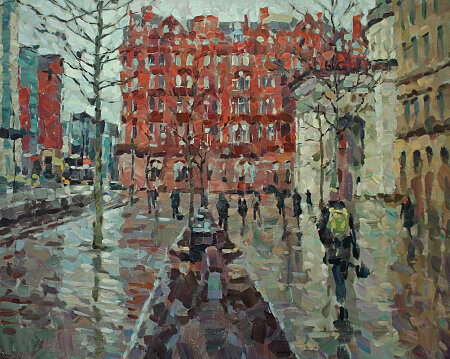
Ann Northcott and the Russian Palace
I don’t really like myself much, she said, looking away.
Is that your secret?
No.
Why don’t you like yourself?
She shrugged. I don’t have much going for me.
Well, I think you do. How about if I like you enough for both of us?
She showed no response to my attempt at humor. I wanted to get to the Russian Palace before asking any more questions. It was still snowing as we walked the ten or so blocks from Grand Central. Ann’s coat was buttoned up, but she shivered.
At last, we were seated in deep aromatic warmth—brown leather booth, bright white tablecloth, sparkling silverware. The limping, black-jacketed waiter brought tea and bread. We ordered borscht and khinkali and herring shuba; somehow I still recall the dishes. Uncomfortable silence, uncomfortable to me, anyway, settled on us. Ann idly rubbed her fingers over the tablecloth, moved the silverware around. I could see that, to her, I lacked a certain reality. Across the restaurant, older men were smoking cigarettes. Vodka was everywhere, she noted, except at our table.
Do you think you could get us some?
I doubt it.
Try.
I ordered a shot. I was eighteen, which at the time was the legal drinking age in New York. It came promptly, plunked down indifferently by the waiter. I bolted it, shook involuntarily, and signaled for a second. Ann drank it surreptitiously.
Now all I need is a cigarette.
Sorry. If I smoked, I’d reluctantly give you one.
I watched the waiter limp among the tables. It’s odd that I remember what we ate but not much of what we said the rest of the evening, except for a few short exchanges. I recall her saying her parents weren’t home much and she was an only child. Clearly, there was more to her state of mind than that. I can still see blank desolation in her fascinatingly beautiful face. She had not engaged with much of anything in life yet, was just sliding over the ice of it for now, mocking most everything, but someday, somehow, some way, I was sure, she would take hold. She was onto something, unconsciously, and I wanted to know what. I remember thinking that. Saying it to her would have been impossible. I also recall turning to look at the décor behind me that at some point had seemed to captivate her—Tsarist filigree and emblems and paintings against gold-trimmed green walls, candlelit sconces, a large religious painting, some Russian saint. For effect I said: He seeks the courts of New Jerusalem, where he’ll cast his crown at the feet of the Lord.
Ann Northcott thought for a moment.
If I had a crown, it would be crushed and broken.
*
I saw her home. We did not kiss. The idea of making an attempt felt wrong—she seemed untouchable, inviolable, at least by me; for all her mischief, I sensed an unapproachable remoteness. She did not look at me. I wondered whether she had kissed Preston. (Not likely.) She will always be a mystery to me; was I a mystery to her? More likely an insignificant episode, forgotten or, if recollected at all, a momentary occurrence involving a train ride and a strange meal.
Time whisked us on. I still have that lock of rough blonde hair, in a small envelope. I don’t know that it’s right to keep it. Or to throw it away.
